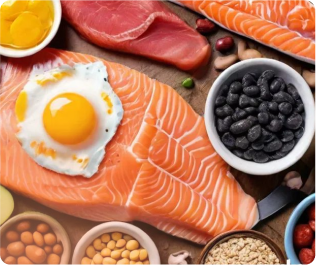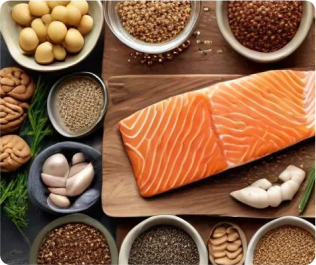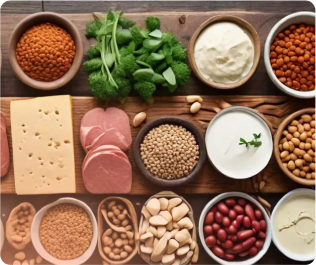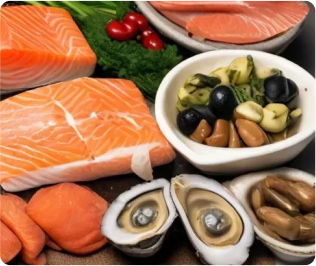Get to know the types of dietary supplements, and when you should consider using them.
Introducing supplements safely
It’s really important to remember that you shouldn’t start taking any nutritional supplements without discussing it with your clinician first. Certain supplements can interfere with other medications you might be taking, or cause complications when used alongside health conditions like diabetes or kidney issues. Very high doses of certain vitamins and minerals can also cause toxicities, so it’s always best to make sure you’re only taking what you need to.
By speaking with a clinician first, you can be sure you’re taking the right supplements for you, and not risking any side effects by using supplements you don’t need. You’ll also have the peace of mind that these supplements won’t interact with any health conditions or other medications you’re taking.
NUTRIENT PROFILES
Ginger

Found in: Ginger tea; smoothies; cooked into meals
Recommended intake: 1,500 mg, divided into smaller doses throughout the day.
Contraindications: May increase bleeding risk, particularly if you’re using blood-thinning medication (like warfarin). Can also affect diabetes medications by altering blood sugar levels.

Found in: Yogurt (with active or live cultures); sauerkraut; tempeh; kimchi; miso; kombucha; fermented pickles; natto; kefir
Recommended intake: Probiotics are measured in colony-forming units (CFU), which are an indication of how many cells can reproduce to make small companies. For general health and immune support, it’s recommended you take 5 billion CFU each day – but the best dosage for you will depend on the strain you’re using and your individual health.
Contraindications: Typically safe to use, but can cause complications if you’re severely immunocompromised.
B-Vitamins

Found in: Meat (especially liver); poultry; seafood; eggs; milk; mushrooms; fortified cereals; leafy green veg (cabbage, kale, spring greens, spinach); legumes (peas, chickpeas, kidney beans)
Recommended intake: It depends on the type of B vitamin. For adult men, it’s recommended to aim for a daily intake of 1.2 mg vitamin B1; 1.3 mg vitamin B2; 16 mg vitamin B3; 5 mg vitamin B5; 1.3 mg vitamin B6; 30 mcg vitamin B7; 400 mcg vitamin B9; 2.4 mcg vitamin B12. Adult women are recommended to get 1.1 mg vitamin B1; 1.1 mg vitamin B2; 14 mg vitamin b3; 5 mg vitamin B5; 1.3 mg vitamin B6; 30 mcg vitamin B7; 400 mcg vitamin B9; 2.4 mcg vitamin B12.
Contraindications: In high doses some B vitamins can damage nerves, or cause kidney disease to worsen.

Found in: Whole wheat flour; spinach; quinoa; nuts (almonds, cashews, peanuts); black beans
Recommended intake: For adults between 19 and 30 years old, men should try to get 400 mg of magnesium per day, and women should aim for 310 mg. From 30 onwards, it’s advised that men up their daily dose to 420 mg, and women to 320 mg.
Contraindications: If you have decreased kidney function, taking supplemental magnesium can increase the risk of it gathering to dangerous levels in your body.

Found in: Oily and fatty fish (salmon, halibut, mackerel, sardines); egg yolks; red meat; liver; mushrooms; fortified cereals and drinks. But the amount we get from food is very low compared to our daily needs – the best sources of vitamin D are natural sunlight or supplements.
Recommended intake: Adults should try to get 15 mcg of vitamin D each day.
Contraindications: Can cause calcium to build up to dangerous levels if used alongside a calcium supplement, if you’re not deficient in calcium.

Found in: Hard cheeses; beef; liver; egg yolks; chicken; fatty fish; sauerkraut; natto; kefir
Recommended intake: There isn’t an official daily recommended amount of Vitamin K2 – it isn’t quite the same as the “total” amount of vitamin K. But trying to get around 32 mcg of vitamin K2 each day is reasonable to help heart health, as well as preventing complications related to calcification.
Contraindications: Can interfere with proteins that are necessary for blood clotting, so speak to a clinician if you’re using blood thinning medication (like warfarin).

Found in: Dairy products (milk, cheese, yogurt); fortified plant-based milks; winter squash; edamame; almonds; leafy greens (kale, spinach, bok choy, spring greens)
Recommended intake: 1,000 mg per day for those aged 19-50. For women over 50 and everyone over 70, it’s recommended to up this to 1,200 mg per day.
Contraindications: Taking excessive calcium from supplements can be linked to cardiovascular problems and kidney stones.

Found in: Fatty fish and other seafood (salmon, mackerel, tuna, herring, sardines, anchovies, oysters); nuts and seeds (flaxseed, chia seeds, walnuts); plant oils (flaxseed oil, soybean oil, canola oil); cod liver oil
Recommended intake: You should try to consume 1.0 g of omega-3 fatty acids each day from food and supplements, with 250-500 mg of that being a combination of DHA/EPA – two specific omega 3 fats.27
Contraindications: Could reduce platelet activity in your blood, which can increase bleeding risk in high doses (or if used with blood thinning medications like warfarin).

Found in: Protein powder is its own supplement, so isn’t usually found in other foods – but other dietary sources of protein include meat and fish; meat substitutes (tofu, tempeh, plant-based alternatives); dairy products (milk, yogurt); nuts and seeds; legumes (beans, lentils, peas)
Recommended intake: It’s recommended you try and get at least 0.75g of protein for each kilo of your body weight each day. This is usually around 55 g for men and 45 g for women – but this varies from person to person.
Contraindications: While there aren’t any contraindications for protein itself, the type of protein powder you use could upset your stomach if it contains other ingredients that you’re intolerant to.
Alpha-Lipoic Acid

Found in: Red meats, organ meat (liver, heart, kidney); broccoli; spinach; brussel sprouts; tomatoes; potatoes; carrots; beets
Recommended intake: Adult women should try to get around 1.1 g of ALA per day, whereas men should aim for 1.6 g daily.
Contraindications: Can contribute to low blood sugar levels if used with diabetes medicines.
Multivitamin

Found in: Multivitamins are nutrient supplements that can help compliment a balanced diet, but aren’t found in food themselves. However, it’s typically better to get your vitamins from your diet instead. Some nutrient-dense foods you can eat to up your nutrient intake include kale; liver; fatty fish (salmon, sardines, anchovies); seaweed; shellfish; eggs; whole fruits and vegetables
Recommended intake: It depends on the multivitamin you’re using. Speak with your doctor or nutritionist to determine which nutrients you might be deficient in, and make sure you follow the instructions on how much to take each day.
Contraindications: While there aren’t any direct contraindications with multivitamins, too much of some vitamins can result in toxicities. Speak with a healthcare professional before you start taking any multivitamins or supplements, to make sure they’re right for you.